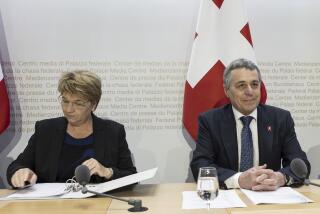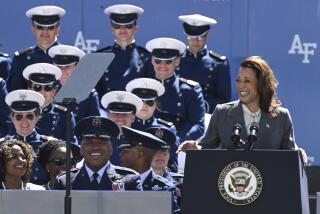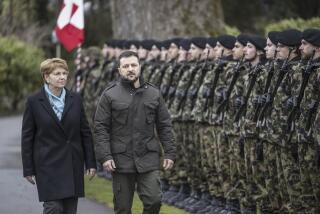Syria peace talks will start in January, U.N. says
BEIRUT — Long-delayed peace talks designed to end the bloody conflict in Syria will begin Jan. 22 in Geneva, United Nations Secretary-General Ban Ki-moon announced Monday, amid growing international alarm about the rise of Islamic militant rebels inside the country.
The so-called Geneva 2 negotiations — sponsored by the United States and Russia — would mark the first meeting between the Syrian government and opposition representatives aimed at ending the 32-month-old civil war.
Despite Monday’s announcement, some observers expressed skepticism that the talks would take place. There is considerable doubt that a broad array of opposition representatives will agree to attend without ironclad guarantees that the process would lead to the departure of Syrian President Bashar Assad.
The aim of the Syria talks is to set up a transitional government in Damascus based on the “mutual consent” of the opposing parties. The transitional administration would have full executive powers, including control of military and security units, according to a blueprint hammered out last year by world powers.
In comments backing the planned meeting, U.S. Secretary of State John F. Kerry emphasized “the growing threat from extremism and foreign fighters within Syria.”
The rise of Al Qaeda-linked factions within the rebel ranks has caused deep consternation in Washington and other Western capitals. Many fear a consolidation of militant enclaves in the heart of the Middle East. U.S. and European officials also worry that Syrian-trained terrorists, including many with Western passports, will leave and wreak havoc abroad.
The Geneva talks were originally scheduled for May, but deep differences among Syria’s fractious opposition forces have proved a barrier to getting both sides to the negotiating table. The U.N. announcement Monday appears to be an effort to force the issue and set a firm date for what could be a forum laying the groundwork for a new political order in Syria.
The timing also suggests that diplomats hope to capitalize on momentum from the just-concluded talks in Geneva concerning Iran’s nuclear program. On Sunday, representatives of six world powers and Iran reached a preliminary accord that would put constraints on Tehran’s nuclear program in exchange for limited relief from international economic sanctions.
The transitional administration in Syria is meant to pave the way for free elections and a democratic government. Syria has been ruled for more than four decades by the Assad family and its allies.
Assad’s government, which has had strong backing from Russia, has said it will send representatives to the Geneva 2 talks. But similar guarantees have not been forthcoming from the deeply divided opposition.
The major, U.S.-backed political opposition group, the Syrian National Coalition, has a limited presence in Syria and has been rejected as illegitimate by some rebel groups fighting in the country. The coalition has named several conditions for participating in peace talks, including the opening of corridors for humanitarian aid, the release of prisoners and a guarantee of Assad’s eventual ouster — a demand rejected by the Syrian government.
Various Islamist rebel alliances, some aligned with Al Qaeda, have also sprung up within Syria, and several have rejected both the U.S.-backed coalition and any plan for talks that do not result in Assad’s departure. Officials have said that the Al Qaeda-linked groups will not be invited to Geneva.
It is unclear what countries will be invited to the conference, aside from the United States, Russia and Syria. In particular, officials said Monday that it was not known whether Saudi Arabia and Iran, bitter rivals in Middle Eastern politics, would be invited. Iran supports Assad’s government, while Saudi Arabia supports the opposition.
More to Read
Sign up for Essential California
The most important California stories and recommendations in your inbox every morning.
You may occasionally receive promotional content from the Los Angeles Times.










